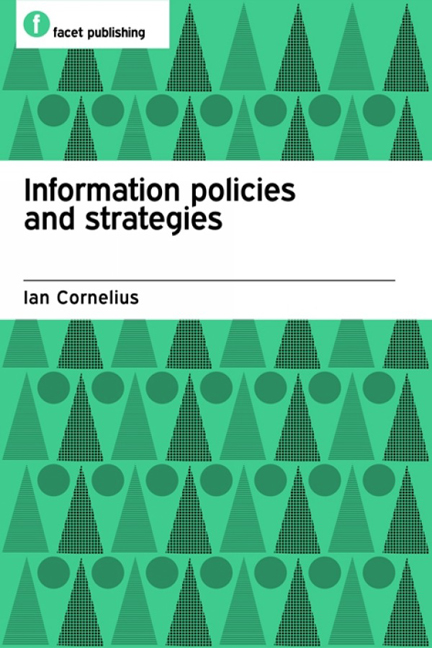Book contents
- Frontmatter
- Dedication
- Contents
- Preface
- 1 Introduction
- Part 1 Contexts for information policy
- 2 Globalization and information societies
- 3 Information policy and the public sphere
- 4 Information rights and information policy
- Part 2 Information policy sectors
- Part 3 Conclusion
- References and reading list
- Index
3 - Information policy and the public sphere
from Part 1 - Contexts for information policy
Published online by Cambridge University Press: 08 June 2018
- Frontmatter
- Dedication
- Contents
- Preface
- 1 Introduction
- Part 1 Contexts for information policy
- 2 Globalization and information societies
- 3 Information policy and the public sphere
- 4 Information rights and information policy
- Part 2 Information policy sectors
- Part 3 Conclusion
- References and reading list
- Index
Summary
DISCUSSION OF THE information society idea and information policy gave us the idea about weak and strong theories of information policy, and also the ideas of autonomy for information policy and the operational frameworks for them. The idea of the public sphere is so closely identified with the exchange of information and the rules governing it that information policy must seem either redundant, because the public sphere is a socially and historically determined environment that itself constitutes the rules for information exchange, or it must seem that the public sphere legitimates a regime of information policy to sustain its existence. This divergence we will unravel later. At present we just need to identify some of the characteristics of the public sphere and some of the arguments about its nature.
We are all familiar with public discussion of topical issues, be they international or national political questions, the world economy, questions of social norms and expectations, or disease, war, education – in fact all the issues of modern life. We are also used to ceaseless coverage of leisure activities in the media – sport, music, films, even books, and the lives of celebrities. Many of us are now also daily consumers of more private information that we individually put into a public arena, or make publicly accessible, through social networking media like Facebook, Twitter and so on. This volume of publicly accessible information is a recent phenomenon that poses and faces several threats. One threat, mentioned in Chapter 1, is to personal privacy as we disclose so much about ourselves. Another more recent potential threat is to the existence of the institutional forms through which we are accustomed to getting our public discussions – the serious newspapers and television programmes. Many of these depend on advertising revenue and now face closure as two forces combine to assail their revenue. First, the current economic downturn, which is diminishing advertising budgets and revenues, and this is escalating the impact of, second, a more long term decline in advertising as many staple sources of small town and national newspapers find alternative and cheaper ways to advertise through the internet. Strange as it may seem now, the forces that controlled advertising have been identified by the major author of ideas about the public sphere as the primary cause of corruption in the public sphere.
- Type
- Chapter
- Information
- Information Policies and Strategies , pp. 43 - 62Publisher: FacetPrint publication year: 2010



